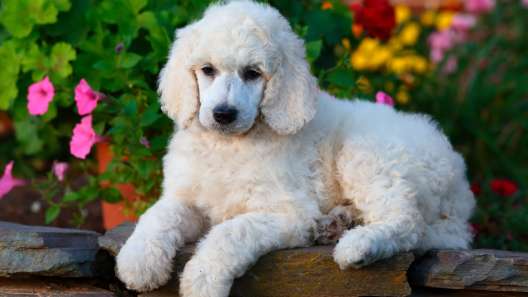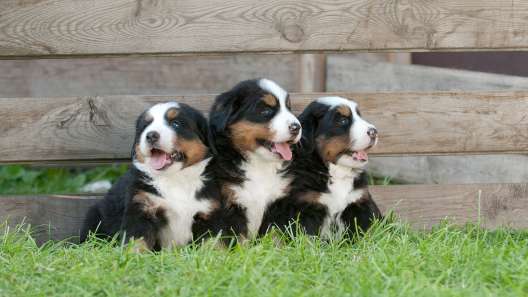
-
Activity Level:
moderate
-
Shedding Level:
low
-
Grooming Level:
high
-
Trainability:
high
-
Good for Novice Owners:
high
-
Adaptability:
high
-
Kid/Pet Friendly:
often
-
Prey Drive:
low
-
Watchdog:
chill
- Average Size: Large
- Average Lifespan: 10-15 years
- Registered?: other
Bernedoodle Dog Breed Information
Overview
Temperament
Adaptability
Health
Owner Experience
Grooming
Activity Level
Size
Life Span
Did You Know?
The Bernedoodle is a cross between a Bernese Mountain Dog and a Standard Poodle. These large, fluffy dogs are known for their non-shedding coats and lovable personalities. Bernedoodles tend to be a great addition to any family!
Although the Bernedoodle is not currently recognized by the American Kennel Club, they are recognized by other dog registries. The American Canine Hybrid Club, Designer Breed Registry, Designer Dogs Kennel Club, and more all recognize the Bernedoodle.
With some of the most affectionate dog breeds as parents, it’s no surprise that Bernedoodles are known for their affectionate, loving personalities and sweet, gentle dispositions. As long as they are properly socialized, they tend to be open and friendly dogs that get along well with just about anyone.
These dogs tend to do well with children, other dogs, and other pets. Although they can be initially wary and watchful at first, they even tend to warm up quickly to strangers once introduced.
Bernedoodles are highly adaptable dogs. They thrive in homes with yards where they can run. Despite their size and energy, they can also adapt to apartment living as long as they get enough daily exercise and attention.
These dogs tend to handle the cold better than the heat; you may even have some trouble getting them to come back inside after some playtime in the snow. Because Bernedoodles bond so closely with their families and enjoy nothing more than being around them, they do not like to spend long periods of time alone.
Potential health concerns to be aware of in a Standard Bernedoodle can include hip dysplasia, elbow dysplasia, eye problems, and Addison’s Disease. They can also be prone to skin issues like sensitive skin, allergies, and hot spots. Good breeding practices make a big difference in the health of puppies, so it’s important to talk to the breeder about it.
Reputable breeders screen their dogs to avoid passing issues to puppies. Make sure you ask about the health and genetic history of both of the parents. You can also ask about any health tests or clearances that have been done.
As a large dog breed, the Standard Bernedoodle is also at risk for bloat like both parent breeds. Because bloat in dogs can become dangerous quickly, and fatal if the stomach flips, it’s important to know how to reduce the risk and the symptoms to look for so you know when to get to the vet.
The Bernedoodle is a highly intelligent and easily trained dog breed. Some facts about Bernedoodles are that they are a good fit for owners of any experience level and tend to pick up commands easily.
Bernedoodles can sometimes be stubborn as puppies, so it’s important to be patient, stay calm, and keep focused on praise and positive reward when it comes to training. Although they tend to grow out of this initial stubbornness with age, puppy training classes will certainly help with training and socialization early on.
Bernedoodles tend to have a longer coat that ranges from curly to wavy. Although they tend to be non-shedding, they still need a lot of maintenance to keep their coat looking great. Daily brushing to remove tangles and prevent mats along with grooming every 6-8 weeks are recommended.
In addition to coat care, you will also need to take care of your Standard Bernedoodle’s nails, ears, and teeth. Nail trims once or twice a month are usually enough to keep nails from growing too long. Ear checks weekly with careful cleanings as needed can help prevent ear infections.
Daily dental care for dogs early and throughout your dog’s life can help prevent painful dental diseases later in life. Brushing daily along and cleanings at the vet as needed are an ideal start to a good dental care routine for your Bernedoodle.
Standard Bernedoodles can range from moderate to high energy. They tend to sit in a more moderate activity range and have bursts of higher energy when they play. These dogs are known to play hard and energetically until they are tired, but are not usually considered high-energy dogs.
Daily walks plus playtime and some time to run should be enough for a Bernedoodle. But, these dogs will likely be up for more activity if you are. They will love the opportunity to spend more time being active with you.
A fully-grown Standard Bernedoodle usually stands 22-29 inches tall and weighs 50-90 pounds.
Standard Bernedoodles generally live for 10-15 years on average.
A Bernedoodle is also sometimes called a Bernese Mountain Poo.









